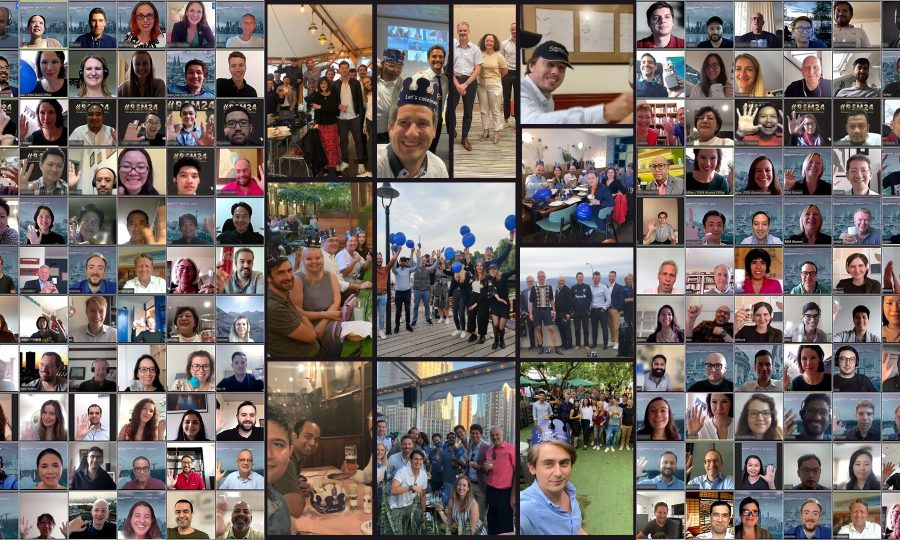Why your data could be more valuable – and risky – than you think
Think your business doesn’t need to worry about IP rights around data? Think again, says IP expert Myriam Davidson (EMBA, 2014)

The Fourth Industrial Revolution is here: we’re navigating a knowledge-based and data-driven economy that is changing at incredible speed. It’s being driven by an exponential increase in computational power and the availability of mind-boggling amounts of data. And one of the most important question every business should be asking is: how do we manage, develop and implement intellectual property (IP) rights around that data?
Your first thought might be: “Every business? Not me – I don’t have any IP or data.” That’s something I hear a lot: not everyone realises how prevalent intellectual property is. Perhaps that’s because there are so many different types of IP: patents, trademarks, trade secrets, and so on. But every single business has IP ¬– and every business has data in some way, shape or form. That’s why this issue is relevant for every business.
Intellectual property rights systems have been around for hundreds of years. For example, the patent system was developed to promote innovation and the betterment of society. There’s a give-and-take: you tell us how to do it and we’ll give you a monopoly for a few years. After that, other people can build your idea, and society progresses. A product might have multiple types of IP that interplay within it. A running shoe might have a trade secret behind the company’s manufacturing process, and also have a utility patent on the type of foam it’s made of, design on the aesthetic look, trademark on the brand, and copyright on the material surrounding its marketing.
Data is similar: there are going to be multiple different types of intellectual property that could apply. And because this is such a new field, it will evolve over time. It’s vital to remember that there is no harmonisation. Understanding the law of the jurisdiction in which you are operating or collaborating is going to be crucial. This applies both to privacy regulations and how data can be protected.
So how might that work? For example, I have a temperature sensor which is telling me that it is 21 degrees in my hallway. That doesn’t mean anything in terms of IP – facts cannot be copyrighted. But some sort of creative arrangement, annotation or sub-selection of that data might be. Perhaps someone has come up with a way of structuring this data point – and millions like it – from temperature sensors across the country, to carry out a meaningful analysis. Copyright could apply there.
Perhaps you’ve worked out how to put an AI machine learning system on your data, so it can be retrieved more quickly. In that case, a utility patent might be applicable – if you want to tell the world about it. If you don’t, then it could be a trade secret: an intangible asset whose value resides partly in the fact that nobody outside your company knows about it. Algorithms applied on the data could also be a trade secret.
Not intentionally managing and protecting your data opens your company to risk – whether it’s regulatory violations, cybersecurity theft, or inadvertent loss of rights. So, what decisions do you need to make around your data and IP? To get to a meaningful answer, start asking questions. There are going to be a lot of different considerations relating to the sources of your data. Where is it coming from? Are you licensing it from other people? Are you developing it? Are you scraping it from the internet, which could have privacy or copyright concerns? What are you doing with your data once you have it? Is your data is being transferred across jurisdictions or borders? If your data is being shared, what are the licensing terms?
This last is particularly important when you are collaborating with other companies: who owns what when it comes to your data? Don’t relinquish your rights simply because you haven’t considered all your options. It’s worth spending more time than you think you need to determine the terms of what these collaborations are going to look like.
And perhaps you’ll come across a great opportunity – but there’s a high price to pay once you dig down into the IP issues. This is particularly relevant for small and medium enterprises as they’re growing and scaling. Perhaps you’ll be offered a great deal of revenue, but you’ll have to give up your IP rights when it comes to your data. At this point, step back and think: in terms of your long-term commercialisation and value proposition roadmap, is this project worth it?
Your data is an incredibly powerful and tangible asset – and it should be managed as such. So be intentional when it comes to the management, development and implementation of IP rights. Ask the questions. Make sure you understand the answers. If you don’t, you risk diluting or losing your rights altogether – or infringing someone else’s. The new era of data is coming, whether we like it or not. It’s exciting – and it’s going to have a huge impact.
Myriam Davidson (EMBA 2014) is Director of Engagement at Stratford Intellectual Property



